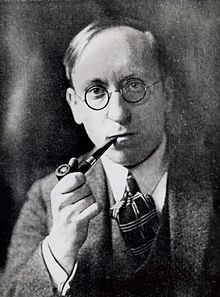Wies Moens
Aloisius "Wies" Cesar Antoon Moens (born January 28, 1898 in Sint-Gillis-Bij-Dendermonde , † February 5, 1982 in Geleen ) was a Flemish poet and nationalist. His activities earned him a prison sentence after the First World War and the death penalty after the Second World War , the latter he escaped by fleeing to the Netherlands .
Life
Moens studied Germanic Philology at the University of Ghent from 1916 to 1918 . He published in the student magazine Aula and through the magazine De Goedendag came into contact with foreign avant-garde movements, especially with German Expressionism , whose humanitarian direction he combined with his Catholic and Flemish nationalist views. After the First World War Moens had to serve a prison sentence for his activism until 1921, during which time he wrote the pacifist work Celbrieven and two volumes of poetry, which made him a leading exponent of Flemish Expressionism. Moens also worked for the expressionist magazine Ruimte from 1920 to 1921 , followed by Ter Waarheid (1921-1924). From 1923 to 1925 he published his own monthly Pogen .
After Moens had completed his military service following his imprisonment, he became secretary of the theater company Vlaamsche Volkstooneel , for which he translated international works. From 1926 on, Moens turned more and more to the political struggle and, among other things, propagated a folk art in the tradition of Albrecht Rodenbach and René de Clercq in his magazine Dietbrand , which was published between 1933 and 1939 and which should belong to a Greater Dutch idea. He rejected the new "Burgundian" direction of the Verbond van Dietsche Nationaalsolidaristen (Association of Greater Dutch National Solidarists, Verdinaso), which he co-founded - including Wallonia in a Greater Dutch Empire - and resigned from it.
During the German occupation of Belgium in World War II, Moens headed the spoken broadcasts of the Flemish Radio from April 1941, then from January 1942 the "Sender Brussels", which distributed National Socialist propaganda during the occupation . In 1944 he resigned because the German pressure was too great for him and he was not ready to advertise the Flemish Hitler Youth and support the anti-Semitic excesses.
Despite the resignation, Moens was sentenced to death in absentia in May 1947. At first he lived in hiding and fled to the Netherlands with the help of friends. There Moens worked as an employee of a publishing house, teacher of a Carmelite high school and founder and director of a community college. He had been married to Margaretha "Grietje" (née Tas) since 1922, who followed him into exile in the Netherlands and died in 1968. Moens spent the years after her death in increasing loneliness. After his death, the Vormingsinstituut Wies Moens was founded, which deals both with Moens' work and as an educational institution in his sense.
Web links
- Catalog of works and biographies at the Digitale Bibliotheek voor de Nederlandse Letteren (Dutch)
- Website of the Vormingsinstituut Wies Moens (Dutch)
- Literature by and about Wies Moens in the catalog of the German National Library
| personal data | |
|---|---|
| SURNAME | Moens, Wies |
| ALTERNATIVE NAMES | Moens, Aloisius Cesar Antoon (real name) |
| BRIEF DESCRIPTION | Flemish writer |
| DATE OF BIRTH | January 28, 1898 |
| PLACE OF BIRTH | Dendermonde |
| DATE OF DEATH | 5th February 1982 |
| Place of death | Jellies |
